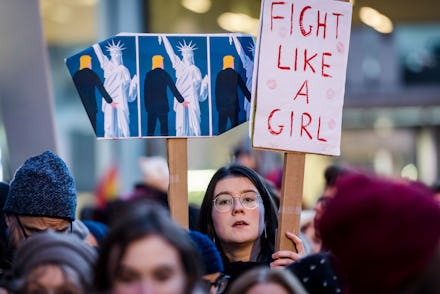Women of color are being blamed for dividing the Women's March — and it's nothing new

With more than 500,000 demonstrators, the Women's March on Washington is the largest anti-Trump protest to date. People from across the country are joining together under the rubric of feminism to present a unified message:
Women's rights are human rights.
It seems like it would be an easy cause to get behind, especially if you're protesting someone with such a gratuitously misogynistic past. But as would be the case for any gathering of hundreds of thousands of people, there were differences that threatened a feminist fantasy of solidarity.
The idea for the march started with Teresa Shook, a retired attorney living in Hawaii, who made a Facebook event page for what began as the Million Woman March. But because it borrowed the name from a 1997 protest of black women, it was soon changed to the Women's March on Washington, a nod to Martin Luther King Jr.'s civil rights march. According to the Los Angeles Times, the name was even approved by King's daughter Bernice, and soon Tamika Mallory, Carmen Perez and Linda Sarsour — three veteran New York City activists — signed on as co-chairs.
Still, the march had its issues. Some women called for it to be more intersectional, for it to acknowledge race, class, immigration status and all of the other facets that make up women's identities. When women spoke up about these differences, though, they were charged with dividing the protest and turning it into something "controversial."
Just as women as a group had failed to rally behind a female presidential candidate, New Yorker contributor Jia Tolentino wrote in a piece on Wednesday, so did they with the Women's March, turning it into a source of "unexpected conflict."
The months leading up to the march, she observed, had given way to both "fracture" and "inspiration."
Tolentino admitted it would be unfair to attack the women involved in the march for something so petty as not getting along. But other outlets have ignored this nuance in favor of casting blame on those who would ask more of a march meant to represent half the world's population and their allies, a tall order by any metric.
To be clear, it's largely women of color who have called for the Women's March to be more inclusive and representative.
On Tuesday, Jamilah Lemieux penned a column for ColorLines explaining why she wouldn't be attending the march, arguing that, though many of the organizers were women of color, the march itself centered whiteness.
"Will the Women's March on Washington be a space filled primarily with participants who believe that black lives matter?" wondered Lemieux. "I'm not sure."
Meanwhile, transgender activist Janet Mock discovered that a line she'd contributed to the Women's March platform about the importance of including sex workers had been erased. According to Mic's previous reporting, the site now features a revised version of Mock's original stance. The whole controversy prompted Mock to write a Tumblr post making clear that she wants no part of a movement that shames sex workers.
"I reject the policing within and outside women's movements that shames, scapegoats, rejects, erases and shuns sex workers," Mock wrote.
As valid and constructive these criticisms might seem, some disagreed.
A Women in the World op-ed column suggests women who pointed out the limitations of the march had "hijacked" it because they were "bent on highlighting women's differences." Contributor Emma-Kate Symons said she was tired of women quibbling over trivial matters like "privilege," "white feminism" and "intersectionality" — and yes, she put those words in scare quotes.
"It saddens me to see the inclusive liberal feminism I grew up with reduced to a grab bag of competing victimhood narratives and individualist identities jostling for most oppressed status," Symons wrote.
Heather Wilhelm of the Chicago Tribune did one worse, calling the Women's March an "intersectional torture chamber," as if the very word "intersectional" — coined by feminist thought leader and civil rights activist Kimberle Crenshaw — were some kind of poison.
Wilhelm continued to lament that it was "almost impossible to throw a good old-fashioned protest march these days" and dubbed disputes over inclusivity "feminist infighting."
It's not unusual for women of color to be blamed for dividing the feminist movement.
Feminist scholar Audre Lorde has thoroughly documented this phenomenon, having been on the receiving end of white feminist scapegoating more than once. In her speech "The Uses of Anger," which she delivered at a 1981 National Women's Studies Association Conference, Lorde recounted the times she'd been dismissed as "angry" for bringing critiques of racism into predominantly white feminist spaces.
"When women of color speak out of the anger that laces so many of our contacts with white women, we are often told that we are 'creating a mood of hopelessness,' 'preventing white women from getting past guilt,' or 'standing in the way of trusting communication and action,'" Lorde said.
In short, black women were accused of stunting feminism, thwarting its efficacy and momentum. They were bursting the bubble of "sisterhood" and "solidarity" within a movement that has historically marginalized them.
In order to make any true progress, Lorde maintained that women must agree in some measure to abandon these illusions of unity. Acknowledging women's differences, accepting criticism and embracing each other's anger will only make the feminist movement stronger.
"The angers between women will not kill us if we can articulate them with precision, if we listen to the content of what is said with at least as much intensity as we defend ourselves against the manner of saying," Lorde said.
"The angers of women can transform difference ... into power."
Correction: Jan. 22, 2017